A standout hockey player in her youth, Olivia Cook ’24 went on to achieve great success as a Division I athlete and make a significant impact in both her Mohawk community of Akwesasne and in remote First Nation communities throughout Canada. Now, she’s a leader at SUNY Potsdam as head coach of the women’s hockey team where she mentors student-athletes, while simultaneously completing her degree in public health.
“The reason I’m here at SUNY Potsdam is because I want to add knowledge and experience so that when I eventually do go back to some of the First Nation communities, I’m able to give them as much knowledge as I possibly can.”
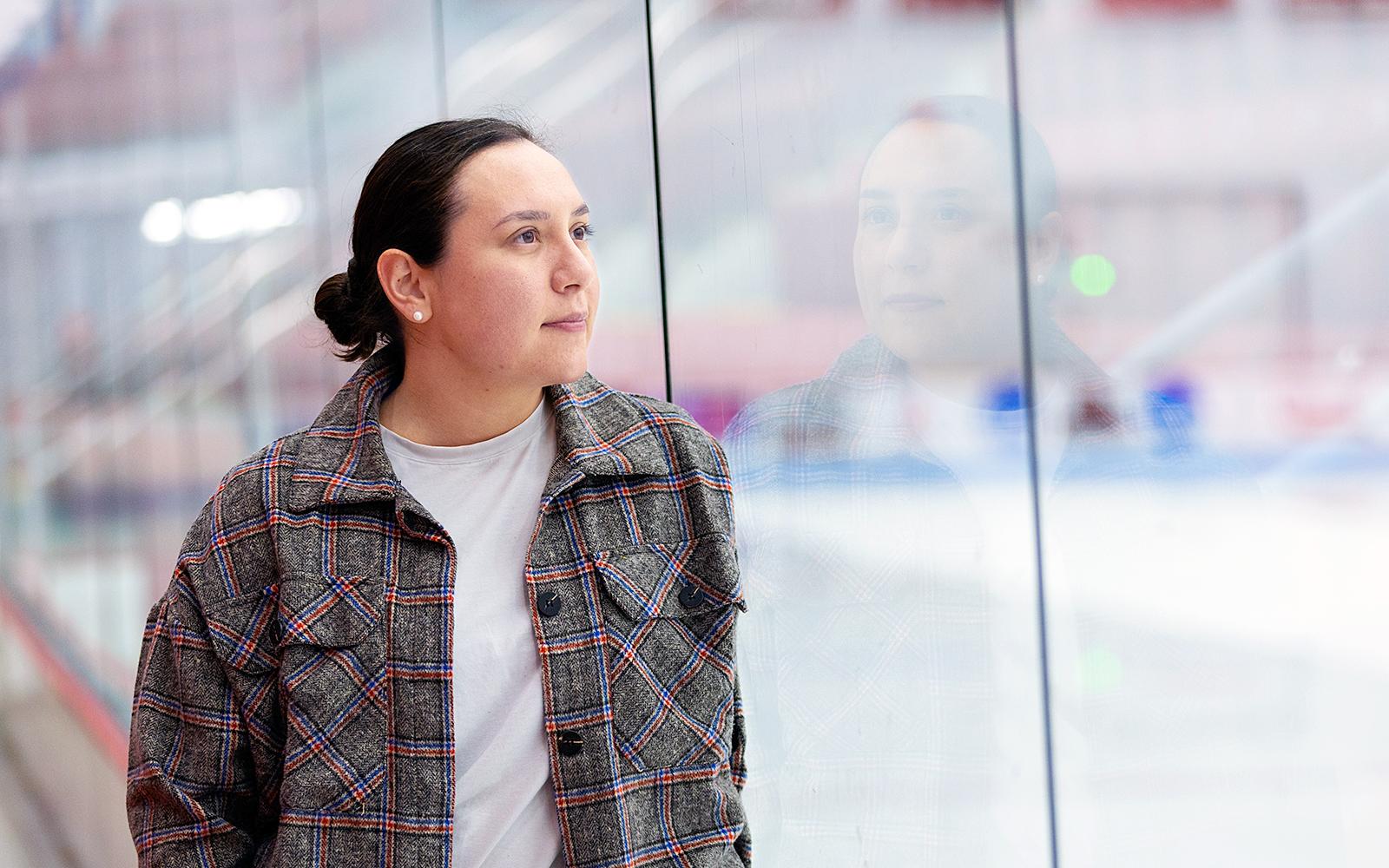
“A big part of me choosing SUNY Potsdam was talking to Terry Francis in Admissions and Tanya Hewitt from the exercise science program. They genuinely wanted to know who I was as a person. Ten years ago, I had a little bit of trauma, so the fear of coming back to school was this lump in my throat, and a sick feeling in my stomach. Talking to people in Admissions at other SUNY schools, I had that sick and nervous feeling, but I never once got that here. It’s a different type of relationship and community here at SUNY Potsdam—it was a human-first approach. Everybody here has been super empowering,” she said.

Her path to SUNY Potsdam began years earlier in Akwesasne, N.Y., a Mohawk nation 30 miles from the College located on the southern banks of the St. Lawrence River. Her family created a supportive environment for her to grow and excel academically, and when she approached them about playing ice hockey, Cook’s parents fully embraced her newfound interest.
“My parents are really cool. Academically my mom was very strict, in the best way possible. They had discipline with grades, but they were not super pushy. They were into hockey because I was into hockey. They were not the sports parents who you hear about all the time who put skates on you as soon as you can walk, they waited until I asked,” she said.
She started playing hockey for a girls’ team in Akwesasne, and then joined a team in Cornwall, Ontario. In the seventh grade, she started playing varsity hockey at Salmon River High School, while continuing to play in Cornwall—winning awards along the way for her outstanding athletic abilities. During her junior year, she joined the Nepean Jr. Wildcats, a minor hockey team that competes against Division III college programs, but shortly into the season, she tore her ACL, and was out for the year. She returned in force her senior year of high school, and was recruited by top division I hockey programs at Clarkson University and Cornell University. She chose the latter, an Ivy League program that was ranked number two in the country at the time.
 Uncertain about her academic path, she studied a range of disciplines ranging from pre-med and education to communication and feminist, gender & sexuality studies. Over the next three years, she also competed at the highest level on the Cornell women’s hockey team, before needing to make a change after her junior year. “I decided to move home because that was the healthiest thing for me. I applied for a job at the St. Regis Mohawk tribe’s prevention program, which focuses on creating healthy, drug-free community spaces, and going into the schools to educate youth about prevention and decision-making,” she said.
Uncertain about her academic path, she studied a range of disciplines ranging from pre-med and education to communication and feminist, gender & sexuality studies. Over the next three years, she also competed at the highest level on the Cornell women’s hockey team, before needing to make a change after her junior year. “I decided to move home because that was the healthiest thing for me. I applied for a job at the St. Regis Mohawk tribe’s prevention program, which focuses on creating healthy, drug-free community spaces, and going into the schools to educate youth about prevention and decision-making,” she said.
For the next six years, she worked for the tribe, visited local schools, and met with teenagers about drug and alcohol prevention to encourage them to make informed and healthy choices. In that role, she collaborated with the Coalition for Community Empowerment, an Akwesasne coalition that focuses on providing drug and alcohol-free events to the people of Akwesasne. And then in her spare time, she started coaching women’s hockey at Salmon River Central School.
“Being back home with the support I had, allowed me to explore those two things. That has been my life—public health work and my passion for hockey and coaching."
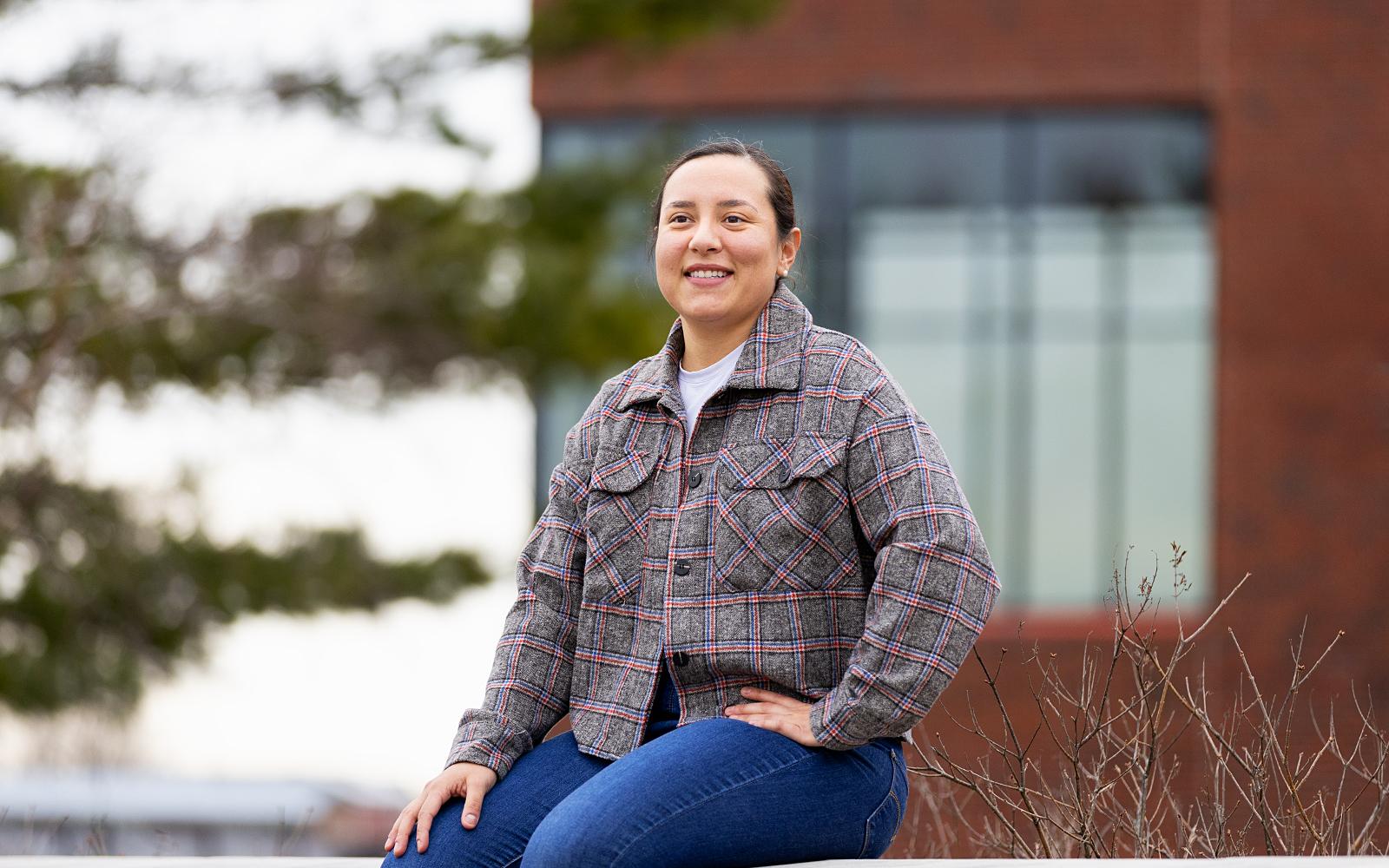
Between her work for the tribe and leadership on the ice, she realized that she had lacked a connection with her Mohawk community in her youth. From years of dedication to hockey, and constantly being on the road for games and tournaments, she hadn’t been involved in many of their traditions. “Coming back as an adult, I was like, ‘Why is there a void in my identity?’ I really didn’t know anything about my community, or much about our traditions. I didn’t grow up in the longhouse, I didn’t have the language, even the regalia, or the knowledge of our cultural traditions. I went to school in this predominately white rural town of Fort Covington, and then we got in the car to go to hockey practice,” she said. “Part of me coming back home and working in the community allowed me to learn more and more about our culture, and who we are as a Mohawk people. It was so beautiful.”
In 2019, six years after leaving Cornell, Cook was given the chance to lace up her skates once again in a competitive fashion, and travel the world. She joined the women’s hockey pro league in Adelaide, Australia, and from Sept. 2019 until March 2020, she traveled around the continent competing against other top athletes in the league from Sydney and Melbourne. As the global pandemic started to shut down the world that spring, she boarded one of the last flights out of Australia before a total lockdown, returning home to Akwesasne as the global pandemic brought the world to a standstill.
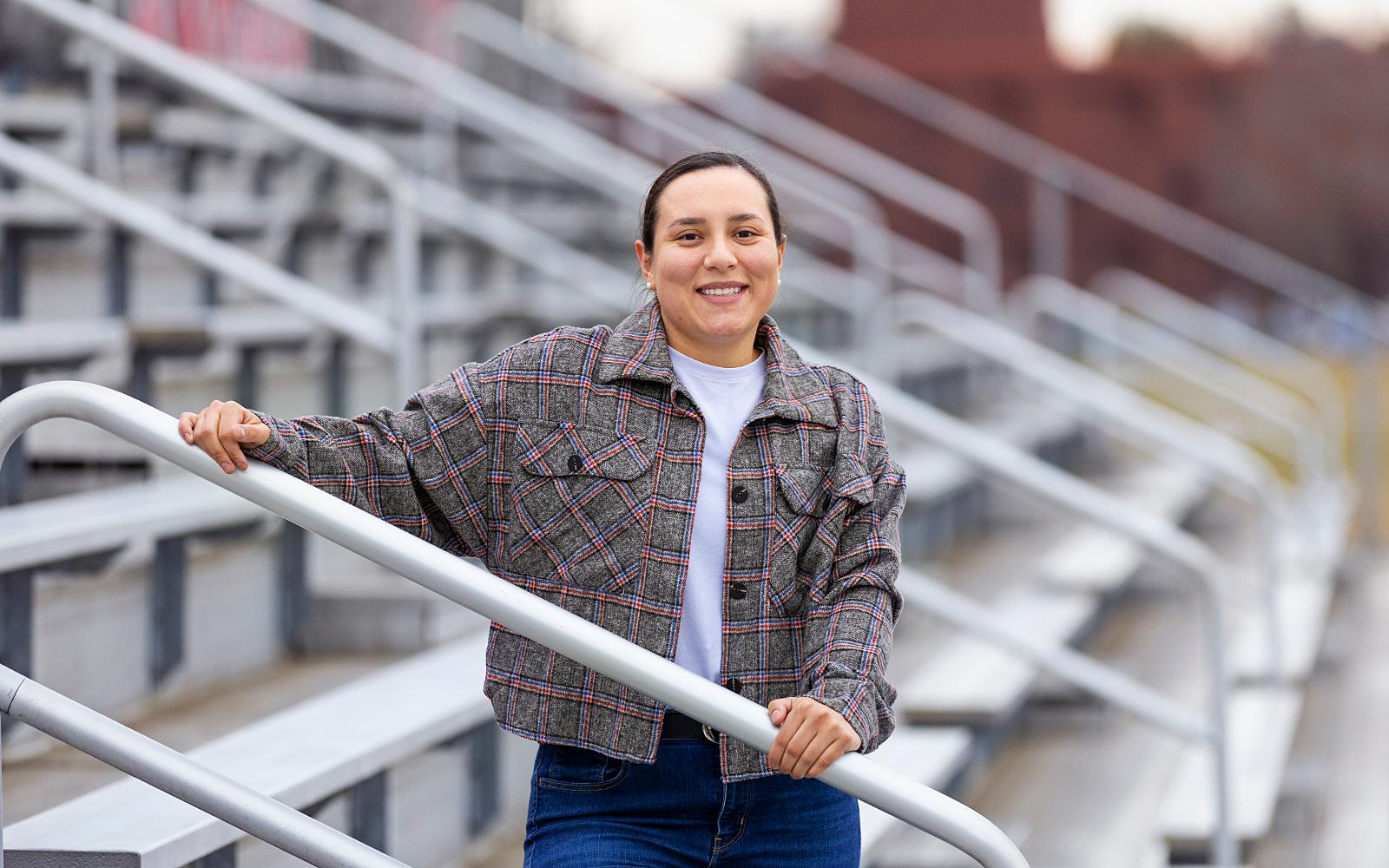
In the summer of 2020, as the restrictions started to ease, she emerged to work within her community once again. A new pilot program was launched with the Holistic Life Foundation, and she jumped at the opportunity to support youth through trauma-informed care, providing mindfulness education, and fostering a safe and supportive environment for students in her community. At the same time, she connected with John Chabot, a former NHL player who created the non-profit First Assist. Chabot invited her to Whitehorse, Yukon, to work with Algonquin youth during a hockey clinic. “It’s an awesome program. I like working with communities, I like breaking down barriers, and I like finding ways to make them feel healthy—and if hockey is involved that’s a bonus,” she said.
After the clinic, Cook was offered a job with First Assist in Waswanipi, Quebec, a remote Cree community with a population of 459 people. Tasked with overseeing all the instruction for winter sports within the village, and teaching ice skating skills to children and teenagers, she became a role model for youth in the community, while weaving public health education into her instruction. Waswanipi opened her eyes to the vast challenges facing people in remote First Nation communities.
“When we talk about food deserts in public health, and we talk about food justice and resources, there are so many communities that have nothing. My goal in going into these communities was to build relationships, that was everything. I brought my partner, who is a woman, and showed them that we are two brown, queer women who are educated, and this is a healthy relationship. Having this experience to be a role model and show them what positive and healthy communication looks like was the world to them. There are so many people, whole communities, that don’t have that. That was my primary agenda, just creating healthy relationships,” Cook said.
In the summer of 2022, she was hired for another job placement with First Assist in Rapid Lake, Quebec, an even more remote and impoverished First Nation reserve. Again, using sports to connect with the Algonquin community of 582 people there, she set up a nightly softball league, and created softball tournaments to unite the community and promote exercise. “The diabetes rates for kids were incredibly high because there’s no healthy food. The closest grocery store was an hour and a half away in a French town that doesn’t even speak the same language. It was so different from what we get as Mohawks living in Akwesasne next to civilization,” Cook said.
It was during her time in these remote communities that Cook realized she wanted to go back to school to continue her education. “I was proud about what I was building there, but I thought, ‘Why don’t I know more?’ I gave them everything I could, but at the end of my contract in Waswanipi, I just wished I had more to give, that I had more knowledge. I started applying to schools and that led me to SUNY Potsdam,” Cook said.
This is the dream. I’m working with young women who are trying to figure out life.”
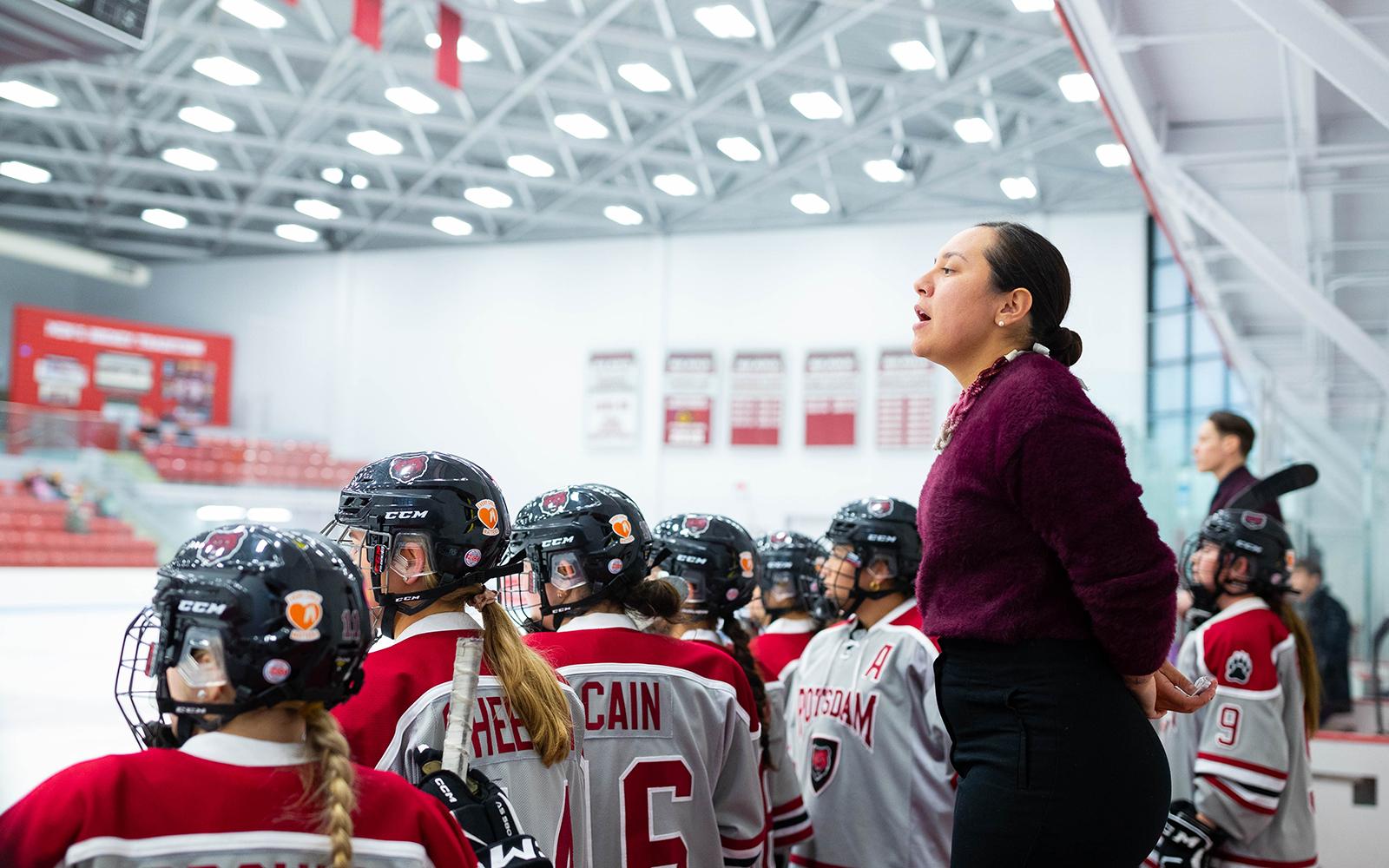
Olivia Cook '24 coaches her team during a game against SUNY Morrisville on Friday, February 16, 2024, at Maxcy Hall.
In the fall of 2022, she made that a reality. She enrolled in the College’s public health program and was also offered a job as a coach on the women’s hockey team. “They’ve done a really good job in our Department of Public Health and Human Performance, reminding me what I’m passionate about, while also highlighting the things that I’ve never done before,” Cook said.
Her connection with her professors is on a much more personal level than ever before. Ten years ago, as a student at Cornell, she had observed a notable hierarchy between students and faculty. “The communication and the support were so different from SUNY Potsdam. One of the things I really love about SUNY Potsdam is that it’s very clear that your professors, and other support systems, are in place to help you succeed and not weed you out,” Cook said.
In classes ranging from Health Disparities to Epidemiology, Cook has benefited from the interpersonal structure of the program while working with professors Dr. Kelly Bonnar and Dr. Kathleen O’Rourke. “They both care about their students, and they are so down to earth during discussions in class. They are so well educated, and they have such unique experiences that add to who they are as humans,” Cook said. “The reason I’m here is because I want to add knowledge and experience so that when I eventually do go back to some of the First Nation communities, I’m able to give them as much knowledge as I possibly can.”
This semester she is completing her capstone internship experiences for her public health degree while working with Martha Palmer, a registered dietician at the Canton Potsdam Hospital, who is also on the Board of Garden Share. “A big part of me getting to work with Garden Share is learning about grant writing and what’s involved with that process,” she said. “I’m super interested in that, because I’ve worked in non-profits in the past, and it’s important for me to gain an understanding about where non-profits get their funding.”
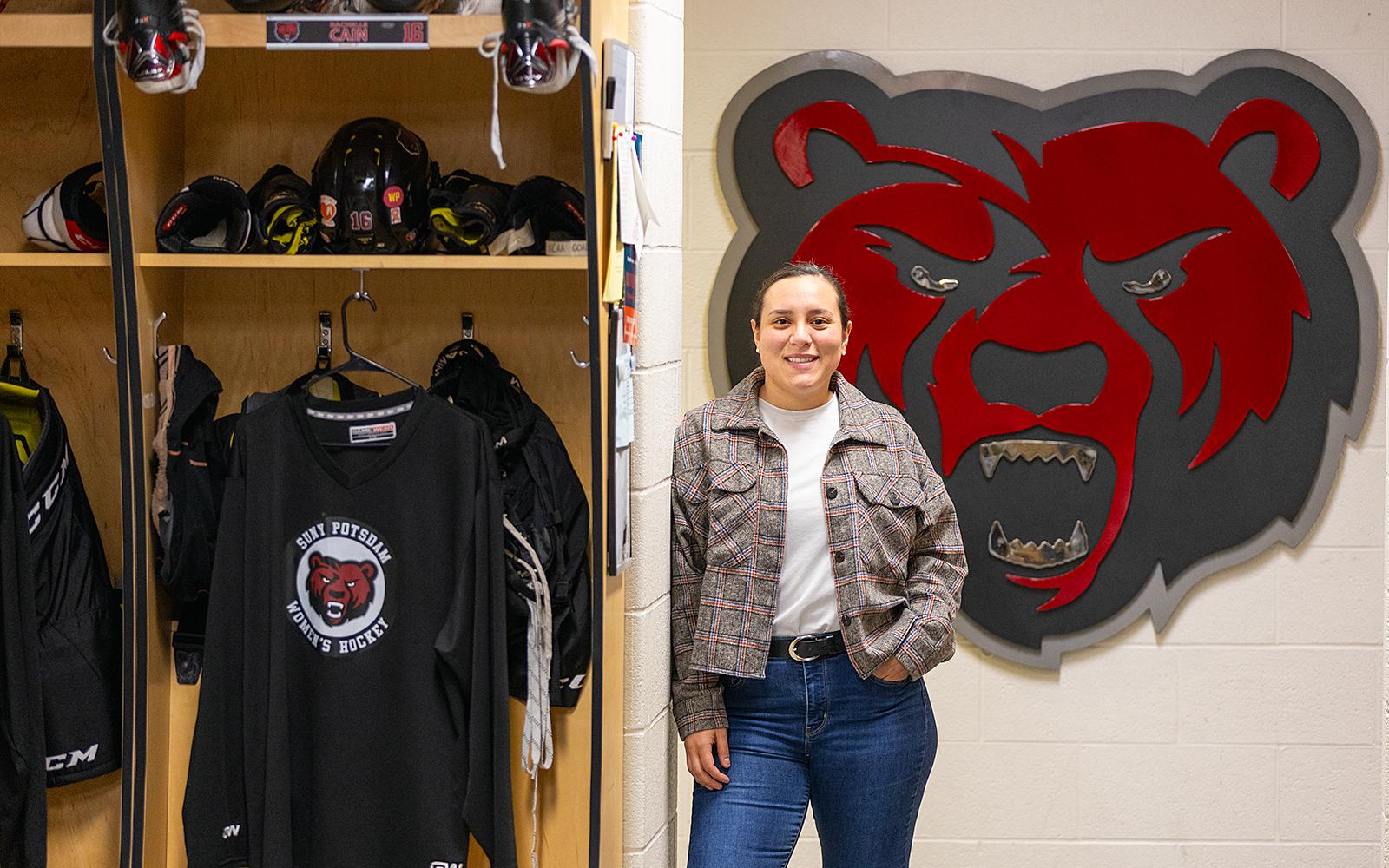
She just wrapped up her first season as the head coach of the women’s hockey team, where she has been using her human-first approach to create a safe environment for her team. “I see the outcome every day in hockey, whether it’s when I’m having a conversation with one of my athletes and putting a smile on their face or having an impact on their confidence or skill level,” Cook said. “This is the dream. I’m working with young women who are trying to figure out life.”
Article and Photos by Jason Hunter
